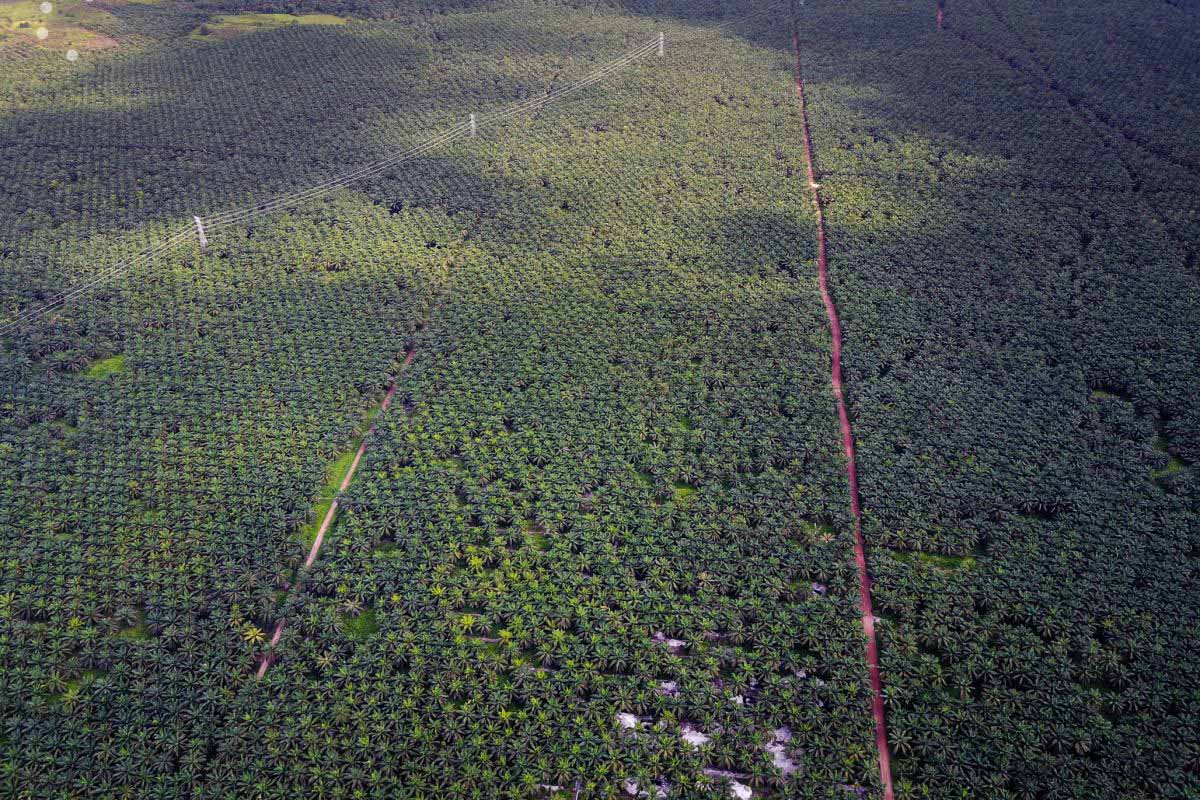Prologue: Jakarta, 2007
On 29 November, 2007, on the tenth floor of a marble-clad office block in Jakarta, the scion of one of Indonesia’s wealthiest families met with a visitor from the island of Borneo.
Arif Rachmat, in his early 30s, was heir to a business empire and an immense fortune that would place him among the richest people in the world. His father had risen as a captain of industry under the 32-year dictatorship of President Suharto. After a regional financial crisis in 1998 forced the dictator to step down, Arif’s father had founded a sprawling conglomerate, the Triputra Group, with businesses ranging from mining to manufacturing.
Arif had come of age as one of the most privileged members of the post-Suharto generation, attending an Ivy League university and cutting his teeth in a U.S. blue-chip company. He had recently returned home to join the family firm, taking charge of Triputra’s agribusiness arm. Now he meant to position it as a dominant player in Indonesia’s booming palm oil industry.
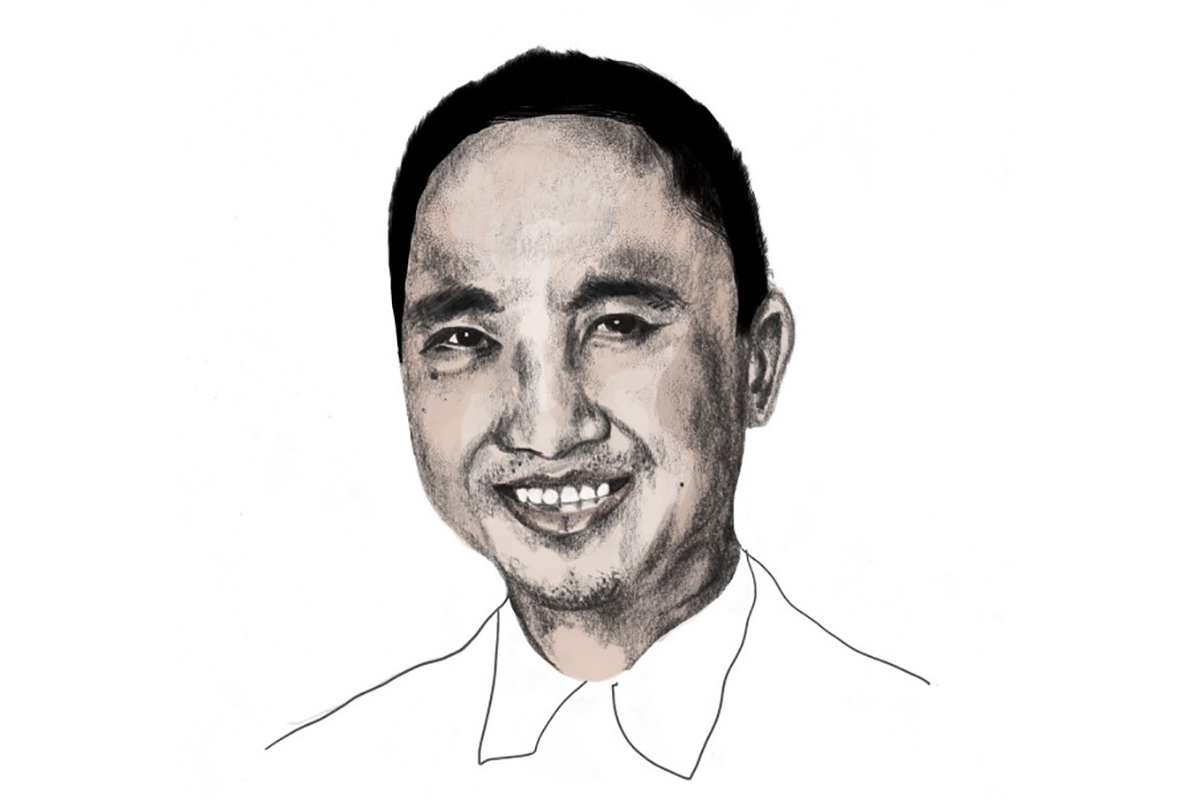
Arif Rachmat, CEO of Triputra Agro Persada
Arif’s visitor that Thursday was Ahmad Ruswandi, a chubby young man with glasses and a propensity to break out into a nervous smile and giggle. A contemporary of his host at the age of 30, Ruswandi came from a different place, but could have been forgiven for thinking his fortunes were on the rise as he rode the elevator up the Kadin Tower.
Ruswandi’s father, Darwan Ali, was chief of a district in Indonesian Borneo named Seruyan, putting him at the vanguard of a new dawn of democracy in Indonesia. Darwan was among the first of the politicians chosen locally to run districts across the nation, after three decades in which Suharto had held the entire country in a tight grip. These politicians, known as bupatis, were afforded vast new powers, including the ability to lease out almost all of the land within their jurisdictions to whomever they deemed fit to develop it.
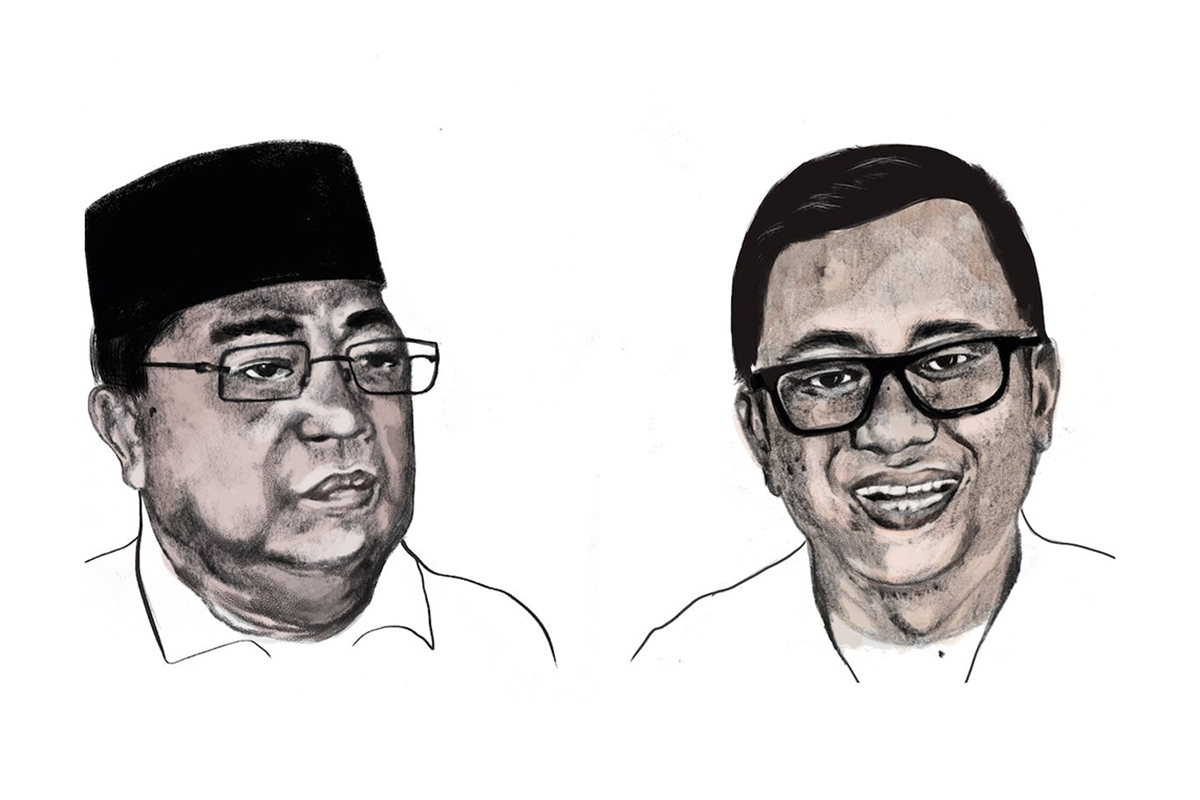
Darwan Ali, left, and his son Ahmad Ruswandi
The bupatis had a choice. They could attempt to usher in economic development while safeguarding the rights of the people they represented. Or they could repeat the sins of Suharto, who had plundered Indonesia’s resources in an orgy of crony capitalism.
The scene in the Kadin Tower would give some indication of the direction Darwan had taken. As the afternoon rush hour descended on the capital, his son Ruswandi sold Triputra a shell company with a single asset, a license to create an enormous oil palm estate in Seruyan. The license had been issued by Darwan himself, who was now in the midst of an expensive re-election campaign. It was not the first shell company Ruswandi had sold, and he was not the only member of the family who would cash in on Seruyan’s assets.
Over the past nine months, The Gecko Project and Mongabay have investigated the land deals that were done in Seruyan during its transition to democracy. We followed the trails of paper and money, tracked down the people involved and talked to those affected by Darwan’s actions. It was a journey that took us from law firms in Jakarta to a prison in Borneo, from backwater legislatures to villages that stand like islands amid a sea of oil palm.
These deals played a part in one of the greatest explosions of industrial agriculture the world has ever seen. In a few short years after Darwan and dozens of other bupatis assumed authority, plantations multiplied throughout the archipelago nation. The resulting destruction of Indonesia’s tropical rainforests catapulted it toward the top of the list of countries fuelling climate change.
This agricultural surge is routinely cast as an economic miracle, rapidly bringing income and modernity to undeveloped regions. In this narrative, expansion was planned, controlled and regulated. The harm to the environment was an unfortunate side effect of the moral imperative of development.
But there is another version of the story, one that played out through backroom deals and murky partnerships. In this story, unaccountable politicians carved up other people’s land and sold it to the children of billionaires. Farms that fed the rural poor were destroyed so that multinationals could produce food for export. Attempts to reign in the bupatis were undermined by their ability to buy elections with palm oil cash, and they came to be known, in a nod to Suharto, as “little kings.”
Darwan’s Seruyan deals, while vast, represent a fraction of the total. Their significance lies in what they tell us about how the system was gamed, to allow district chiefs to exploit natural resources, subvert democracy and turn the state into a force that acts against rural people. By delving into his story, we expose the inner workings of a system that can be seen in operation across the country.
Today, the actions of bupatis like Darwan reverberate throughout Indonesia, as conflict and deforestation continue in lands they ceded to companies. Understanding the corruption that occurred in this fragile period may hold the key to ending the crisis.
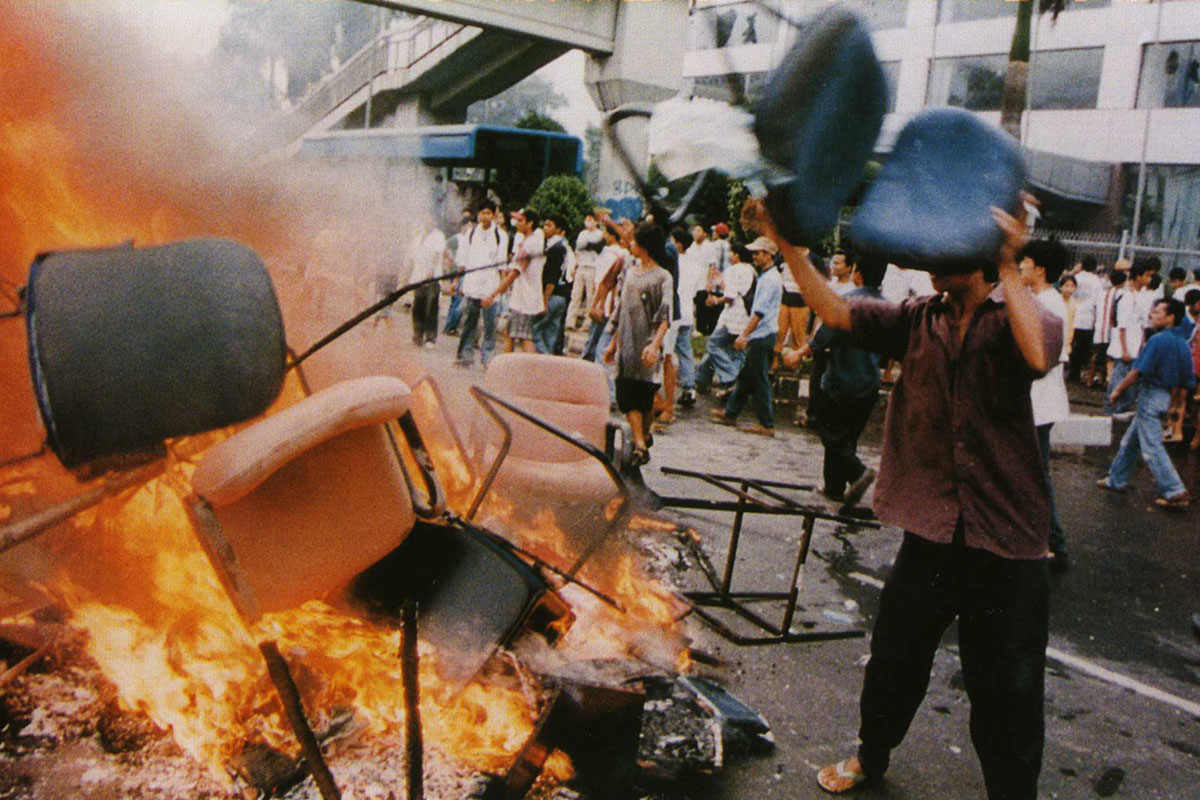
Hundreds of people died in violent riots that swept Jakarta in May 1998. Photo via Wikimedia Commons.
Part One: Indonesia reborn
Darwan’s son Ruswandi was a 21-year-old university student when thousands of protesters occupied the House of Representatives in 1998, demanding the resignation of the ageing Suharto. A regional financial crisis had sent the rupiah into freefall, depriving the dictator of his ability to paper over deep inequalities. Economic growth, as well as a willingness to use the army to impose violent control, had served as the bedrock of his regime. But as the economy collapsed, food supplies dissipated and rioters filled the streets nationwide, he was abandoned by his allies, and finally stood down.
For three decades Suharto had placed whole sectors of the economy in the hands of his relatives and cronies. He was formally charged with embezzling hundreds of millions of dollars in state funds via a network of charities, although he successfully claimed to be too ill to stand trial. A Time magazine investigation estimated that the family had amassed a fortune of US$15 billion. Transparency International ranked him as the world’s most corrupt leader.
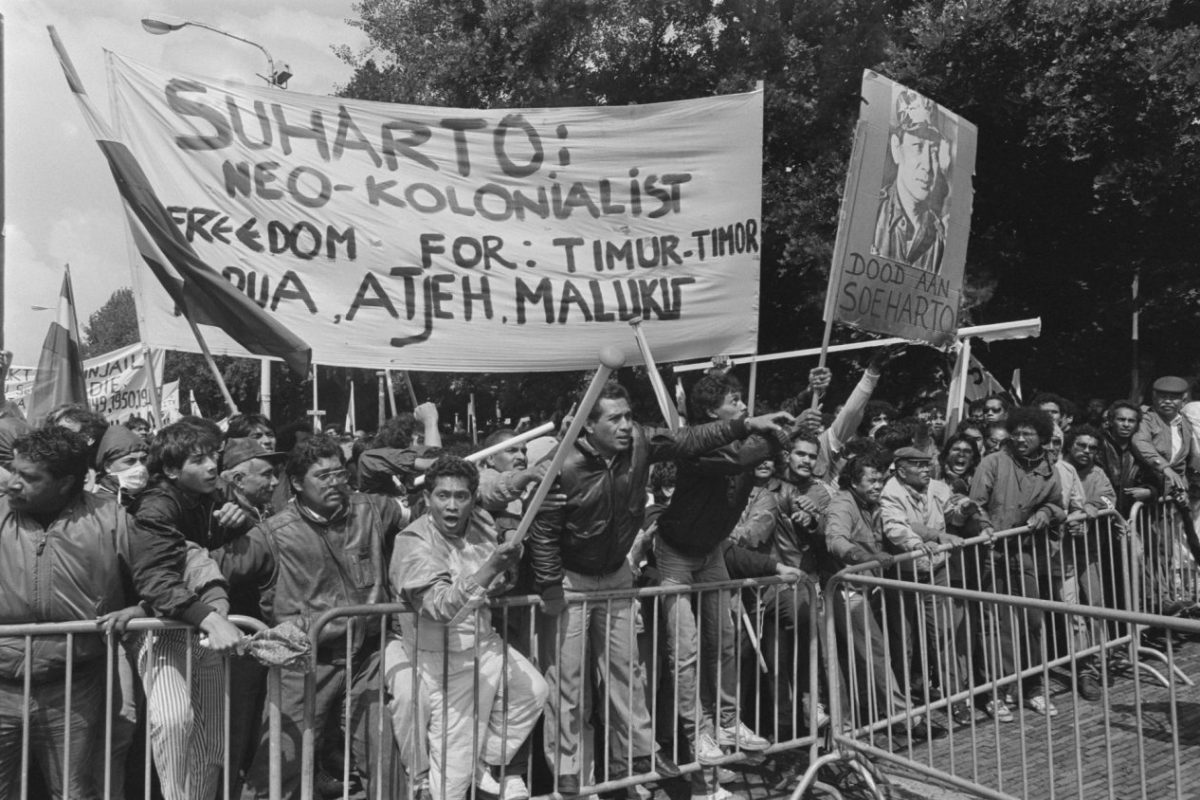
Protesters against Suharto’s treatment of East Timor, which seceded from Indonesia after the strongman president resigned. Photo: Rob Croes/Wikimedia Commons
In the leadership vacuum that followed his resignation, the country threatened to break apart. An implausible nation-state composed of a multitude of ethnically and linguistically diverse people, living across thousands of islands, Indonesia had been held together by military-enforced, highly centralised rule. The bureaucracy had been dominated by Javanese, people from the densely populated island that provided the state with its de facto cultural identity. As their dominance was eroded, long-suppressed identities re-emerged as potent forces. Without the heavy centre of gravity Suharto had provided in Jakarta, the regions began to spin out of its orbit of control.
The jockeying to replace the authority of the Suharto regime catalysed sectarian violence across the archipelago. Separatist insurgencies gained steam in Aceh and Papua. Christians and Muslims slaughtered each other in the Maluku Islands. In Kalimantan, the Indonesian part of Borneo, the notion that indigenous Dayaks had been trodden upon was used to foment violence against migrants in the town of Sampit. Everywhere, the goal was control of resources.
The prize in view for those who could clamber their way to the top was a share in the spoils of Indonesia’s immense natural wealth. Its islands sat atop precious metals and fossil fuels, and were coated in tropical rainforests replete with valuable timber. For three decades, everyone had looked on, powerless, as the revenues from exploiting these resources flowed out of the islands, to Jakarta and the personal accounts of Suharto’s family and cronies. Now they were up for grabs.
It was in this turbulent environment that Darwan Ali emerged as a political force. Darwan had grown up in a staunchly Muslim village on the banks of Sembuluh, a sprawling lake at the heart of East Kotawaringin district, in Central Kalimantan, the largest province in Indonesian Borneo. His origins remain mysterious even to those who have studied the area, but an elder man from the same community told us he was born in the early 1950s into an ordinary family. His parents were tailors who also farmed a small plot of rubber, and named their other boys Dardi, Darlen, Darhod and Darwis. By the 1990s Darwan was operating in the district capital, Sampit, at a time when the local economy was overwhelmingly dependent on logging. Precious hardwoods were extracted from jungles that once cloaked the entire island. The timber was floated downstream into Sampit to be processed and exported.
The logging expanded far beyond what could legally or sustainably be harvested. A shadow economy flourished, predicated on hard cash flushing in from a timber trade unlicensed — but tacitly endorsed — by the local government. Darwan moved in this world, first as a building contractor for infrastructure projects, then as a lobbyist for industry, and finally as a prominent local member of the Indonesian Democratic Party of Struggle, or PDIP.
Darwan’s occasional appearances in local newspapers at the time chart his rise as a representative of the business community, pushing back against any efforts to regulate it or curb its worst excesses. He protests the banning of companies from bidding for government projects due to corruption; he earns controversy for gaining an untendered contract to supply schools with furniture; he complains about taxes imposed on the forestry sector, intended to prevent illegal logging. “The overall impression is of a typical Borneo frontier businessman who makes a lot of money in the black economy,” said Gerry van Klinken, a University of Amsterdam professor who follows Kalimantan politics closely.
“The overall impression is of a typical Borneo frontier businessman who makes a lot of money in the black economy”
As Jakarta’s hegemony receded, and the grip of Suharto’s circle on natural resources dissipated, the shadow economy and the characters who controlled it came to the fore. A timber mafia coursed into protected areas. Tanjung Puting National Park, a mostly swampy forest teeming with orangutans, leopards and crocodiles, was heavily targeted for its ramin and ironwood trees. One local government agency that attempted to stem the flow of logs had its office burned to the ground. When a journalist reported on the illegal logging of the park, he was soon after jumped upon, hacked with machetes and left for dead in a ditch. He narrowly survived, crippled and disfigured.
Beginning in 1999, Indonesia embarked on an ambitious programme of decentralisation, transferring a wide range of powers from Jakarta to local bureaucracies in the hope of both heading off separatist urges and making government more accountable. District heads, the bupatis, were granted the authority to enact their own regulations, provided they did not conflict with existing laws. They exercised this authority liberally. One of the first decisions of the East Kotawaringin administration was to begin taxing shipments of illegal logs, tacitly endorsing the shadow economy instead of confronting it.
In 2002 Seruyan, named for the river that flowed through it, was carved out of East Kotawaringin as a new district. The following year Darwan, who was by then the head of the PDIP party in East Kotawaringin, became Seruyan’s first bupati. His jurisdiction stretched some 300 kilometres north from the Java Sea into remote jungles populated sparsely by indigenous Dayaks. Its western edge encompassed part of Tanjung Puting National Park. It was dominated by the lowlands between the park and Sampit, with Lake Sembuluh at its heart. At the turn of the millennium, more than two thirds of the district remained covered in forest. Though it was thinned out by logging, it harboured a wealth of wildlife that could rival most landscapes on earth.
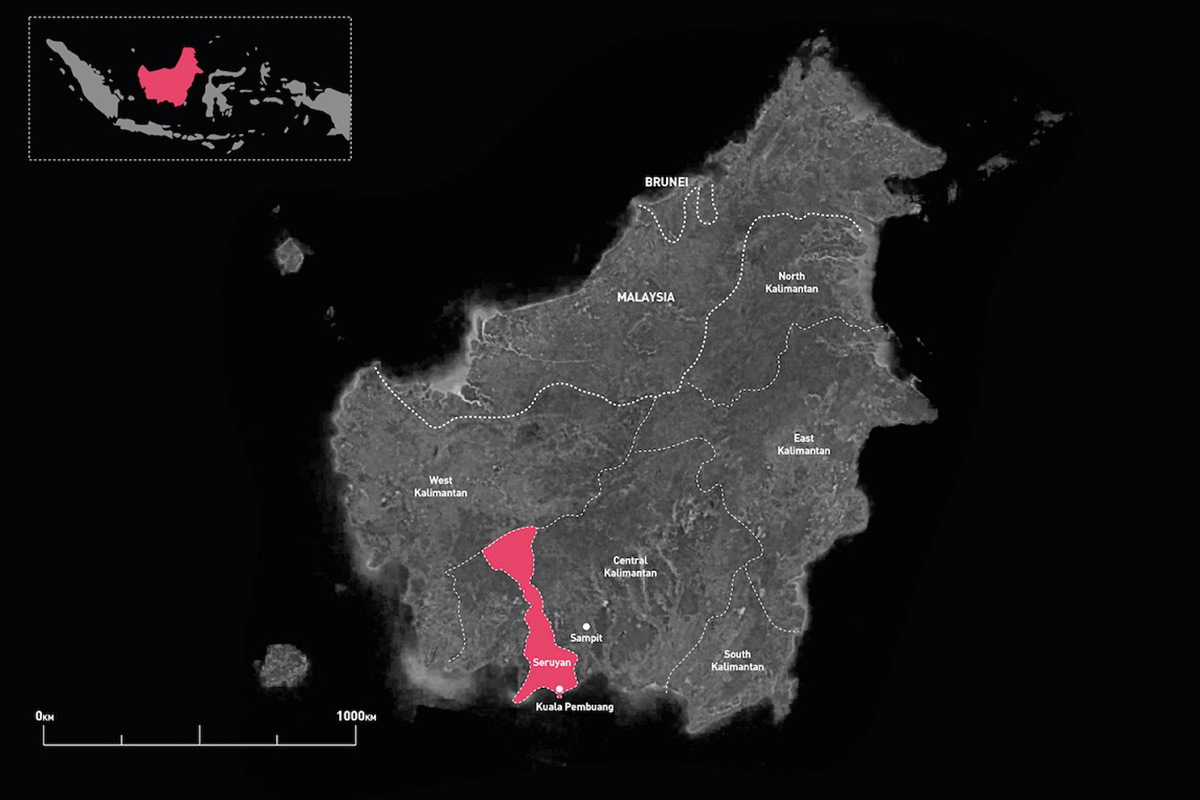
The island of Borneo is shared between Indonesia, Malaysia and Brunei.
The first generation of empowered bupatis were selected by members of the district parliament. Darwan’s ascent surprised some observers, who saw him as a political novice. He was said to have declared that any bureaucrat who backed his candidacy would rise in rank from echelon one to two, or echelon two to three, and so on, failing to grasp that this would actually constitute a demotion. But he was also viewed as a putra daerah, a “son of the soil”, who would fight for his people. He was awarded a five-year term, half a decade to transform the fortunes of his homeland, before facing his constituents at the ballot box.
By 2003 the district economy was stagnating. The log trade was collapsing under the burden of its own excesses. Lake Sembuluh had been a shipbuilding centre that attracted craftspeople from other islands at its height. But the vessels were made from hardwood and for transporting it, and the industry died as the commercial timber dried up. With the most valuable trees already stripped from the forest, Darwan was taking the reins of a district whose heyday as a timber hub, its main source of income, was coming to a close.
Darwan Ali was viewed as a putra daerah, a “son of the soil”, who would fight for his people.
Plantations, specifically for oil palm, were the most obvious replacement. The fruit of the oil palm tree yielded an edible fat used in everything from chocolate to laundry detergent and biofuel. The commodity was in increasing demand globally, and the region south of Lake Sembuluh was seen as having great potential for large-scale development of the cash crop. Though it lacked infrastructure, it was close to the port towns of Pangkalanbun and Sampit. District officials imagined the latter as a vibrant transit town, for labourers coming in to work the plantations and palm oil leaving for global markets. Darwan announced plans to invite investors from Hong Kong and Malaysia. He promised a new harbour to facilitate exports and an easing of regulations.
Marianto Sumarto, a local sawmill owner who had joined Darwan’s campaign team in 2003, said the assumption of power by a son of the soil generated hope. “It made people proud,” he told us. “They didn’t know that behind the scenes, he was playing a bigger game.” – to be continued.
Photos by Leo Plunkett, Sandy Watt, Tom Johnson and Sam Lawson. All other illustrations by Sophie Standing.
This article was curated jointly by the environmental news website Mongabay and The Gecko Project, an investigative journalism initiative established by Earthsight. The article is part of an investigative series entitled Indonesia for Sale.
Recommended stories:
